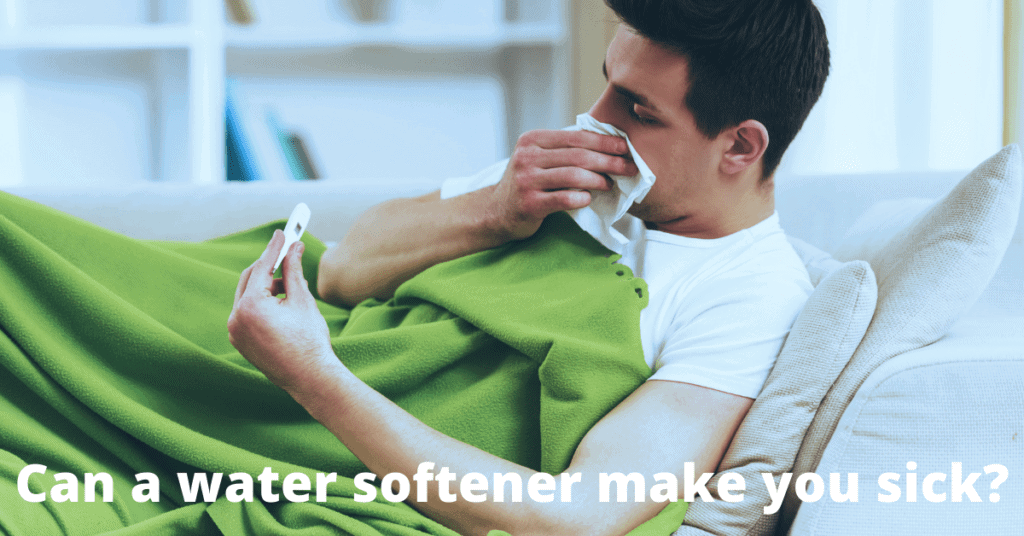
Does a water softener make you sick? When does a water softener become a real problem? Find answers to these questions and much more in this article.
A water softener can make you sick if they are not maintained properly; however, no side effects have been attributed to a properly run unit. To know more, keep reading.
Water softeners are a great way to get rid of the hard, mineral-rich water that comes out of your tap. It’s important to be aware of the risks and benefits of using a water softener before you have one installed in your home.
Before you begin worrying about your water softener affecting your health, you should know how it can be good for your health and when does it become problematic.
Table of Contents
When can a water softener be considered good for health?
Using a water softener could be most beneficial for your skin. Your skin can get a much-needed dose of moisture by taking a bath or shower using water that has gone through the filtration process. It will feel squeaky clean.
It also helps when you have to use soap for medical reasons such as skin irritations or eczema. Specialty soaps usually come with a warning about the hard water in your area and how it can make your skin problems worse. But you don’t have to worry anymore because softening the water takes away the problem.
When does a water softener make you sick?
A water softener shouldn’t make you sick in general, but may if you use it incorrectly. Following are some of the reasons why you could get ill using a water softener.
- One of the most common errors people make when using a water softener is to leave it operating while they go away on vacation. This can lead to excessive and often unhealthy levels of sodium buildup in the pipes of your home.
- Another potential risk with some units is that salt used for regeneration can enter your drinking or cooking water supply unexpectedly causing high sodium intake, which leads to hypertension and other health issues if left unchecked.
- It’s possible for units with unusually high-capacity tanks to also pose an issue because about 30 pounds of salt are needed for every gallon of cleansed water processed through them per day. The large amount combined with more than just the usual amount of time to regenerate can lead to over-saturation or poisoning by sodium.
Other potential problems due to malfunctioning water softeners
You may start noticing some problems with your health if you are exposed to hard water for too long. If the concentration is high, it can cause dry skin, brittle hair, and an irritated scalp.
To make sure that your water system is not causing the above-mentioned problems, you should do a simple test. If the symptoms go away when you stop using the water for 24 hours, it’s probably the softener which could be the source of the problem.
Water softeners are designed to make you healthy, but only if they’re working correctly. However, while it’s possible for a unit to make you sick, it’s not very likely or common.
Common myths about water softeners
Myths related to using a water softener are plentiful and the following are three of the most common:
Myth 1: A water softener increases health risks. Some people avoid using a water softener because they believe it makes them sick. However, in reality, a properly functioning and well-maintained water softener actually reduces your risk to certain health hazards including asthma and skin conditions.
Myth 2: Water softeners do not get rid of contaminants. Even if you’re installing a water softener to reduce your exposure to certain contaminants, it’s important that the unit is properly maintained in order for it to function properly. Proper maintenance includes regular regeneration of the resin in the water softener.
Myth 3: Water softeners can cause cancer. The World Health Organization (WHO) published a report in 2010 about cancer risks resulting from exposure to chlorination byproducts. This report found that while cancer risk was elevated, the risk remained small even at high levels of exposure.
In addition, other studies have not been able to confirm a link between water softeners and any type of illness or disease including cancer.
Conclusion
A water softener can make you sick if it is not working correctly or if it is being used incorrectly. However, if the water softener is being properly taken care of and well-maintained, it should pose no health risks to you. In fact, a water softener reduces your risk to certain illnesses by removing contaminants that would otherwise be in the water supply.
To make sure that you’re using the unit properly, talk to a professional who can help you set up and maintain your system. Then, enjoy all these benefits for yourself.
